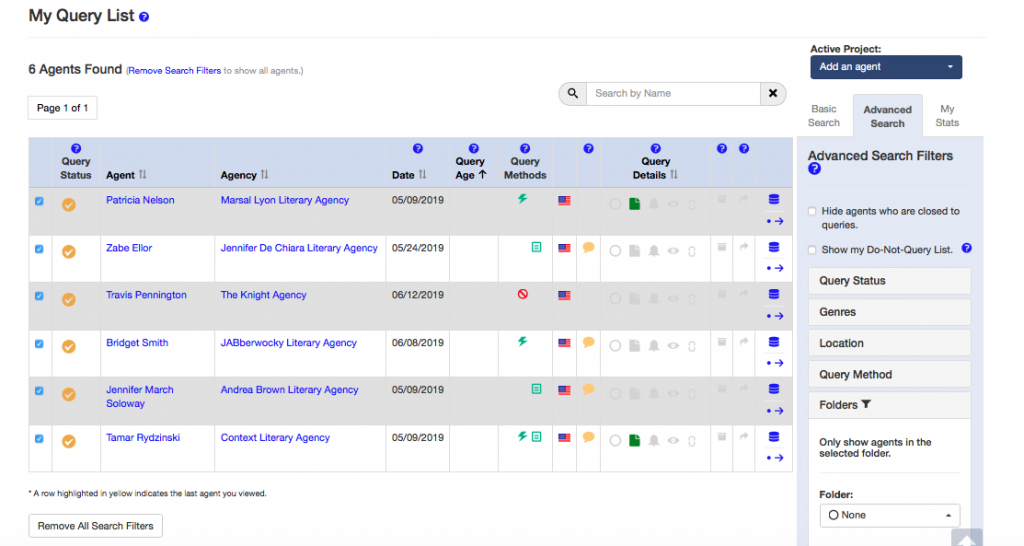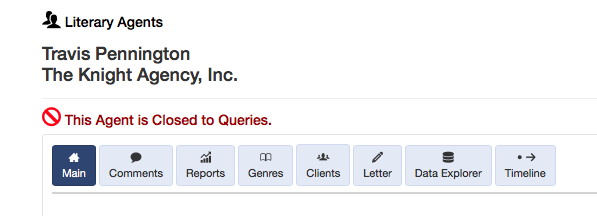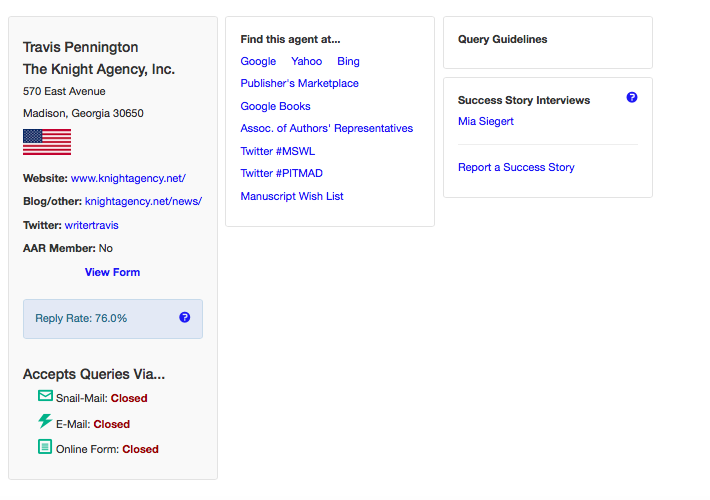QueryTracker: A Must Tool for Querying Agents
If you’re an author or illustrator and would like a literary agent to represent your work, there’s a fantastic software program that will really help you zero in on the right agents to approach. Five years ago when I was querying my second novel, The Stream, I wish I’d known about QueryTracker. I queried after doing painstaking research, looking for agents who handled Magical Realism. I had to organize all my information and tracked responses on a spread sheet I created. It wasn’t bad, but it was cumbersome, and I have since learned that there are many more agents I could have submitted to. Using QueryTracker to help me find agents for my latest novel, I’ve more than doubled the number of agents I’ve queried, and I had a tremendous amount of information about each agent at my fingertips. Below, I outline many of the key components you’ll find on QueryTracker.
What Does QueryTracker Cost?
While QueryTracker is free, I highly recommend paying the modest fee of $25 for the Premium membership, good for a year. When you query agents, you’ll need anywhere from three to six months for the first stage, submitting the query. Of course, if you’re asked for the full manuscript of your work, you may need another three to six months. Either way, a year membership is more than sufficient for a single project. In my case, I revised my manuscript after the first round (I explain why in my post, Query Rejection, What now?), so after a year, I purchased a second year. It’s well worth every penny.

But What Can Query Tracker Do?
QueryTracker is a powerful tool, offering a data base of over 1659 vetted agents. That means that the agents included meet the highest standards of their profession and follow professional guidelines, such as not charging a reading fee. But of the 1659 agents, who is the best for your project? That’s where the power of QueryTracker comes in. You can set up search criteria. For example, let’s say you want to find all the agents who handle science fiction and fantasy, QueryTracker will winnow away all those agents who don’t handle SSF and leave a list of those who do. But maybe your novel is young adult. Again, you can refine your list and take out all the agents who only handle adult titles. Other handy search criteria are agents who are not open for submission and agents in the US. When you’re done, you will have a targeted list of agents to begin researching. For my latest project, I ended up with about 129 agents.
The QueryTracker List
Let’s take a quick look at your list. Across the top, you see the following categories: Query Status, Agent, Agency, Query Age, Query Methods, Country, Comments, and Query Details. Most of these are self-explanatory. Query Age is handy, so you know how long your query submission has been out. Query Methods tells you the ways that agent/agency will accept submissions. Query Details includes lots of other info we’ll get into below.

Researching Each Agent
Here’s where the fun starts. If you click on an agent on your list, a new window comes up with lots of useful links, such as they’re twitter handle, current clients, manuscript wish list, and agency website. In short, these are links that will help you research the agent to see if they are a good fit for your project. There’s even a place to keep notes about the agent, which I found incredibly useful. I usually noted things I liked about the agent and the agency, the kinds of books and genres she represented, what kind of deals she negotiated, etc. Based on my research, I was able to organize agents into separate folders. As I heard back from agents, I noted also what the result was and moved the agent into an appropriate folder.


Authors Helping Authors
Another useful feature is that QueryTracker keeps track of how long it took for agents to respond and what percentage of queries result in a manuscript request or signing an author. Further, users can post questions and comments, which can be incredibly useful. For example, I submitted to one agent using Query Manager (learn more in Managing Query Manager), but when I hit submit, the screen went gray and never came back to normal. I wasn’t sure if the query went through. I posted a question to the QueryTracker community following that agent. Another writer reported that the same thing happened to them, but confirmed that the query went through, as ultimately I found out mine did also. There’s good support from other writers here!
Is QueryTracker Hard To Use?
Query tracker provides excellent videos and Help menus for learning how to use the program, and I found that I was quickly able to come up to speed and get rolling making my lists, researching agents, and sending out queries.
In Conclusion!
I’ve only scratched the surface here for what QueryTracker can do. If you are serious about finding an agent, it’s an indispensable tool for researching, organizing, and tracking agents through the process, start to finish.
Happy Querying To You!

WYNDANO’S CLOAK, by A. R. Silverberry

A. R. Silverberry, Author of The Stream

THE STREAM, by A. R. Silverberry


